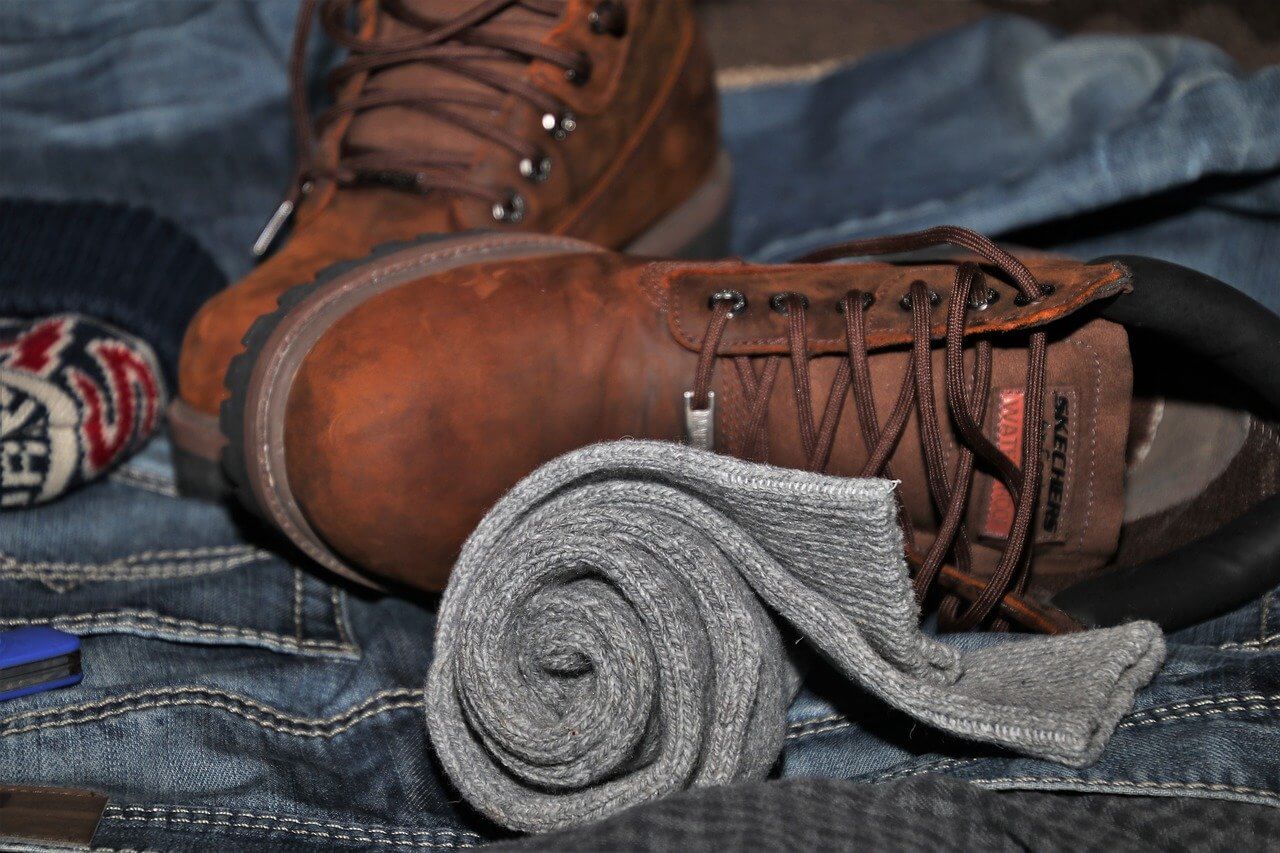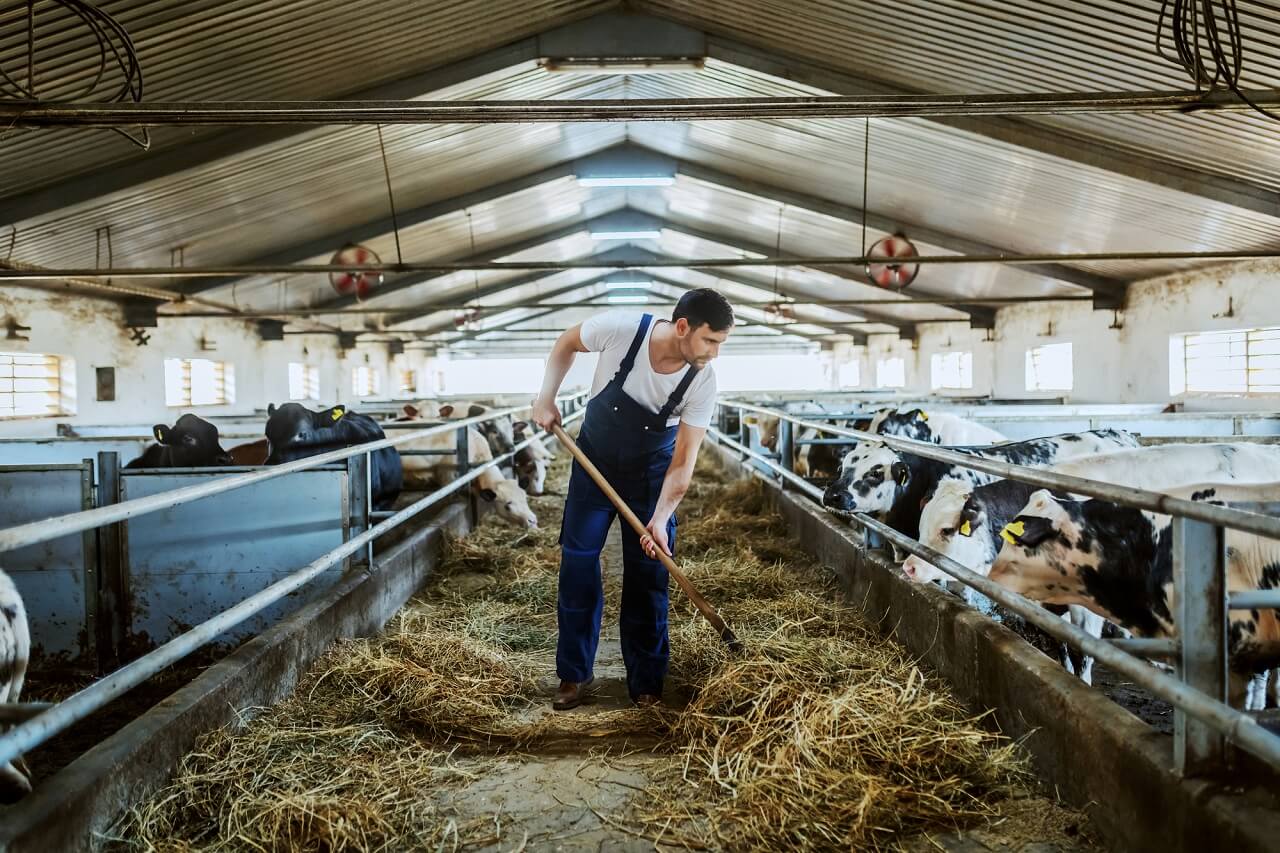Whether you raise chickens, pigs, cows, sheep, or some other form of livestock, there’s no doubt about it – knowing how to wash farm clothes to remove the animal smell is important!
While most people will likely appreciate all the hard work that you do to make sure tables are well-stocked with food, your washing machine is probably not so grateful for the extra work. Farm clothes get dirty – here are some tips on how to keep them stink-free and fresh.
What You'll Learn Today
- How to Get Farm Smell Out of Clothes?
- 1. Use Household Ammonia
- 2. Baking Soda and Hydrogen Peroxide
- 3. Distilled White Vinegar
- 4. Drying Clothes
- 5. Dry Clean Only?
- 6. What About Other Non-Clothing Items?
- 7. Wear a Few Layers
- 8. Put On Some Gloves
- 9. Avoid Harsh Chemicals on Your Skin
- 10. Fabric Refresher to the Rescue!
- 11. Invest in Heavy Canvas Fabrics
- 12. Clean Up ASAP
- How to Wash Farm Clothes – Without Damaging Them
How to Get Farm Smell Out of Clothes?

Can’t seem to shake that unpleasant smell of cow manure? You can always dab some Vicks Vapor Rub under your nose – you won’t be able to smell anything but the menthol!
That’s a joke, of course – but if you want to get that unbearable farm smell out of your clothes, there are a few simple tips you can follow.
1. Use Household Ammonia
An easy way to get farm smells out of your clothes is to use a bit of household ammonia. Just add half a cup of the non-sudsing variety to your washer. Fill the rest of the washer with warm water, making sure the clothes are fully submerged.
Let the clothes soak for half an hour, then wash with a heavy-duty detergent.
If there are still some lingering odors leftover afterward, you can always repeat the process. Whatever you do, don’t add chlorine bleach. When combined with ammonia, bleach can produce toxic fumes.
2. Baking Soda and Hydrogen Peroxide
If you’re looking for a more natural solution to eliminate odors, baking soda is a classic choice. It can be used on its own or you can combine it with hydrogen peroxide for a double punch.
If you use hydrogen peroxide, just be aware it can cause a bleaching effect.
Apply baking soda directly to clothes and let it sit – or if you’d rather use the combined method, fill your washer with warm water, a cup of hydrogen peroxide, and a cup of baking soda. Let it sit for an hour (or longer, if the clothes are super stinky).
If you decide to use this solution, it’s best to mix it up as needed. Hydrogen peroxide won’t be as potent if it is allowed to sit.
Once you’ve allowed the odors to be mostly dissolved in this soak, go ahead and wash with a heavy-duty detergent.
3. Distilled White Vinegar
Although white vinegar may not be as effective as some of the other treatments, it can be a good way to get rid of certain smells. Fill your washer and then add a couple of cups of vinegar to the warm water. Soak your work clothes for three hours, then wash as usual.
4. Drying Clothes
Unfortunately, throwing your farm clothes in the dryer on your typical high heat cycle isn’t going to do much to get rid of any smells.
If you weren’t able to remove all the smells in the regular washing routine, the high heat setting might cause the odors to be pressed deeper into the fibers, making them difficult to remove.
Therefore, if you absolutely have to dry your clothes in a dryer, you should do so on the lowest setting possible. Remove the clothes while they’re still damp and let them air dry.
Line drying is the best way to dry farm clothes. The rays of the sun will help neutralize odors.
5. Dry Clean Only?
When you’re shopping for farm clothes, it’s a good idea to steer clear of picks that are described as dry-clean only.
However, if you wind up with a few garments that are in this category, don’t worry. Just make sure you air the clothing out of direct sunlight – and then get them to the dry cleaners as soon as possible. The longer you let them sit, the harder it is going to be to get rid of the smells.
In some cases, you may be able to handwash an item rather than bringing it to the cleaner’s. Check the garment label for more information, then consider this video for tips on how to hand wash your clothes the right way:
6. What About Other Non-Clothing Items?
Sometimes, the stench seeps into items that aren’t clothing. Even though you can’t throw these items in the washing machine, you still need a way to get them clean.
Shed your work clothes in the garage or mudroom so the odors don’t get into the rest of the house.
If they do, you can use the same treatments above to get rid of the smell (baking soda, vinegar, and ammonia all work well when mixed with water individually). You can blot the stinky areas and then follow up with a simple water rinse to get rid of any residue.
Taking off your clothes before you enter the house is especially important when you’ve been working with chemicals, such as pesticide-contaminated clothing.
7. Wear a Few Layers
Consider wearing a few layers of clothes when you work in the barn. That way, you can shed the outer layer before you go inside so you don’t have to drag the barn smell into your living room with you (or go naked as you head across the house to the shower!).
8. Put On Some Gloves
When you’re working in the barn, throw on a pair of gloves. Not only will this help protect your hands from any hazards, but it will keep odors off them, too. That means less scrubbing when you get inside!
9. Avoid Harsh Chemicals on Your Skin
For all of the potential treatments for stinky farm clothes described above, be careful about getting harsh chemicals directly on your skin.
Ammonia can be irritating, as can things like bleach – even though these are safe to use, you’ll want to avoid direct contact. Plus, if you get chemicals on your skin, it’s going to be harder to wash away the cow smell the next time!
10. Fabric Refresher to the Rescue!
For a quick fix, a simple fabric refresher can be a lifesaver. It is especially helpful for things like cloth seats and car interiors, which you can’t typically throw in the washing machine to get rid of lingering smells.
11. Invest in Heavy Canvas Fabrics
Heavy canvas, particularly canvas outerwear, helps protect the clothes beneath from being infused with unpleasant farm aromas. Consider wearing canvas whenever possible and shed the outerwear before you go inside.
12. Clean Up ASAP
When you come in from your chores, head to the shower ASAP. If you have stinky clothes, put them in the washer and wash them immediately. Avoid mixing them with non-smelly clothing, as the smells might spread to the rest of the uncontaminated load.
How to Wash Farm Clothes – Without Damaging Them

The good news about washing farm clothes is that they tend to be made of very sturdy, durable materials. For the most part, you shouldn’t have to worry about damaging them in the wash.
As long as there aren’t any loose buckles or zippers that can snag or pull, your clothes shouldn’t tear or become otherwise damaged in the wash.
To be on the safe side, flip your clothes inside out. This will prevent any snags. You may want to use mesh laundry bags for more delicate items or shoes. When in doubt about how to best launder an item, wash it in cold water and let it air dry.
Reading the labels on your clothing and detergents is important, but if these aren’t available, the tips above should help you wash your farm clothes without doing any damage.
To prevent your clothes from getting so dirty next time, consider throwing on a pair of bibs or coveralls. These will need to be washed, too – but at least it will mean fewer overall loads of laundry, right?
If you have a front loader washing machine, you can’t fill the machine with water first and add the ammonia, or baking soda, or vinegar. So how do you do that with a front loader washing machine?